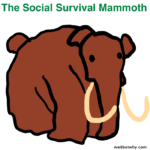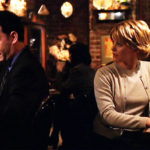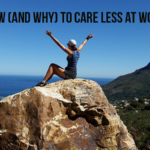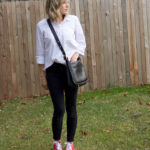
Why are we so obsessed with secret identities?
Do you ever sit at work and think about how you’re two people? Day Job You, slogging away, processing invoices. And Secret Superhero You, who is perhaps, a world-class novelist, cello player, and whiskey aficionado, when not rescuing puppies.
I used to think this. I’d imagine how amazing I COULD be if only I had more time to spend as Secret Superhero Me.
When I was in my early 20s I lived in Brooklyn with my two incredibly ambitious childhood best friends. The three of us were constantly going to social events being thrown by our other insanely ambitious friends, such as underground art shows, off-off Broadway plays, concerts in sketchy warehouses, open mic nights, and book launch parties.
My particular struggle, at that time in my life, revolved around being a reporter for a magazine no one heard of. I was the “nonfood” beat reporter for a top-notch trade publication (that is still around today, I might add) called Supermarket News. (Long live, Supermarket News!)
When a playwright asked what I did, I fudged the details. “I’m a beauty editor,” I said. Or, “I’m a business reporter.” Sometimes it was just, “I’m a writer.” Those were my “Superman” titles. While I was still just Clark Kent.
I felt a little ashamed, and I used this shame as fuel, eventually paying $80 a month for 6PM-to-6AM access to a cubicle on 14th street in Chelsea in a “space for writers” (this was before co-working spaces were a thing).
On weekday nights I went straight to my non-work cubicle after spending all day in my work cubicle, because my bedroom in our apartment did not have walls that extended all the way to the ceiling. (Don’t ask me why. I was too excited about the low rent to care).
In my non-work cubicle I composed essays, pitch letters, research pieces, and humor pieces. I asked other writers in their $80 cubicles how they got published. I did not stop or sleep until I had a list of freelance clips from publications my sketchy warehouse friends had heard of, finally crying real tears in the middle of one work day when a tiny, funny essay I’d written was accepted by The New York Times, and the column’s editor called my desk.
Now, I said, “I’m a writer,” and meant it. I had spoken to a New York Times editor on the phone. I was at peace with myself, and my city.
I treated myself to an entire pint of Ben and Jerry’s that night, gazing out my tiny window into the little backyard that only the more expensive downstairs apartment had access to. I felt like a dizzy combination of all my fictional and real New York writer heros: Elaine Benes, Carrie Bradshaw, Nora Ephron, Susan Shapiro.
When I woke up the next day, it was back to my day job, where I was me, interviewing a sweet-tempered cosmetics buyer for Piggly Wiggly in Florida.
What’s Truly Fueling Your Superpower?
I spent the rest of my time in New York laser-focused on getting more impressive jobs so this secret, somehow legitimate version of me could be revealed.
I worked for Parents Magazine and NBC. I landed freelance gigs for everything from the popular tabloid-style New York Daily News to the niche, immaculately researched, fact-checked, and presented psychology magazine, Esperanza.
I’ve now been working in publishing for almost 15 years, and you know what? When I sat in on meetings along the way with big beauty or personal care brands that wanted to advertise in the publications I worked for, and they asked about my background—can you guess what they fixated on?
Yes. Supermarket News.
“When did you work there?” Intimidating VPs have asked me. It often turns out they read the magazine religiously when they were store buyers, or brand reps, or merchandisers. “If you started out reporting for them, I know you’re good,” one said before agreeing to work with me.
I’ve heard it again and again.
It made me realize: My day job had been fueling my superpower.
It’s where I learned to love the sources in my stories, to form real relationships with them, not just mine them for quotes. It’s where I learned to write on deadline, dig for an angle, and work with a creative team.
I was Secret Superhero Me all along. I just didn’t see it. The journey really had been the important part. I was more comfortable hiding behind my secret identity. If I wasn’t fully owning my situation, it meant I was never really failing. But I shouldn’t have been so afraid to fail in the first place. If I wasn’t afraid, and I saw how valuable that job was, I can only imagine what ELSE I could have been learning and doing there.
I should have been strutting around those sketchy warehouse parties yelling out “I’m the nonfood beat reporter for an amazing niche business publication where I’m gaining valuable skills, a strong reputation, precious relationships, and a way to hone my craft daily [Chugs beer. Throws Solo cup forcefully to feet.]!”
What skills and opportunities are you taking for granted right now?
Write down a list and prioritize those things next week. It might be access to a great manager on another team, the ability to get trained in a certain tool, or the chance to write for your company’s blog. If you can’t think of anything, read a book on positive psychology to give yourself a boost.
You don’t have a secret identity. You’re the superhero. You just have to own it.






Leave a Reply